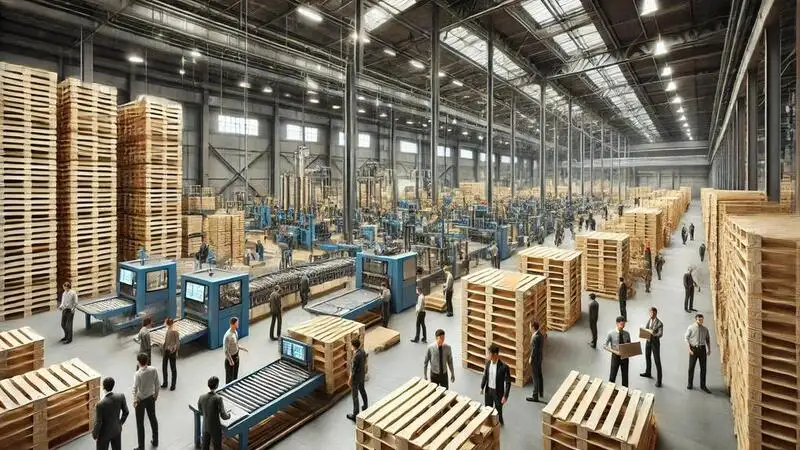Key Takeaways
- Pallet manufacturing is evolving with sustainable practices to reduce environmental impact.
- Innovations such as recyclable materials and efficient designs are paving the way forward.
- Understanding these changes helps businesses make informed decisions for a greener supply chain.
Introduction to Pallet Sustainability
In recent years, the drive towards sustainability has infiltrated every corner of the industrial sector, including the production of pallets. Pallets, the unsung heroes of the global supply chain, facilitate the transport of goods across all industries. However, the environmental impact of traditional pallet production methods cannot be ignored. With millions of pallets in circulation, the push for sustainable practices has gained momentum. The emergence of custom pallets at the vanguard of this environmentally aware innovation makes this transition especially clear.
Why Sustainable Pallets Matter
Sustainable pallets’ significance goes beyond being a conscientious decision; it is a necessary step to conform to international environmental regulations. By making pallet management decisions as simple as choosing pallets made of recycled or renewable materials, any business in the supply chain can help lower carbon emissions. Sustainable pallets may be a key difference in the competitive market and represent a company’s dedication to environmental care. Businesses that implement sustainable practices stand to gain favor and loyalty as customers become more aware of the environmental impact of their products.
Innovative Materials in Pallet Design
Recyclable Plastics
Recyclable plastics have ushered in a new era for pallet design, offering durability and minimizing environmental impact. Unlike traditional plastics, which contribute significantly to landfill volume and pollution, recyclable plastics can be processed into new products at the end of their life cycle. By turning towards recyclable materials, companies reduce waste and lower manufacturing costs associated with raw materials. Integrating these materials into pallet production fosters a circular economy that aligns with sustainable development goals.
Biodegradable Composites
Biodegradable composites, made of materials that decompose naturally over time, are an exciting development in the quest for greener pallets. They represent a significant step forward in minimizing landfill dependency. When these pallets end their lifecycle, they degrade without leaving a harmful residual footprint. Using biodegradable materials in pallet production signifies a harmony between industrial activity and environmental preservation, setting a precedent for future innovations within the industry.
Reusable Wooden Pallets
Wooden pallets have long been a mainstay in logistics because of their affordability and durability. However, sustainability concerns have led to the evolution of their design using responsibly sourced timber and methods that ensure multiple uses over time. These enhancements make modern wooden pallets sustainable, providing longevity and reducing waste. By focusing on reusability and recycling, businesses can significantly diminish their environmental impact while continuing to meet logistical demands efficiently.
Energy-Efficient Manufacturing Processes
The pallet industry is increasingly adopting energy-efficient manufacturing processes as part of its sustainability initiatives. Technological advancements enable reducing energy consumption and emissions during production, fostering a balance between economic viability and ecological responsibility. Energy-efficient processes decrease operational costs and contribute to a lower carbon footprint, underscoring their importance in modern manufacturing. This dual benefit of environmental and economic gains makes energy-efficient practices a cornerstone of sustainable pallet production.
Benefits of Sustainable Pallets
Sustainable pallets offer many environmental and financial benefits. Because of their longer lifespans, they usually require fewer replacements, which reduces trash production. The upfront investment in sustainable pallets can lead to long-term savings and a return on investment through decreased material costs and operational efficiencies. Furthermore, as today’s customers choose organizations that promote ethical and ecological policies, businesses that engage in sustainability upgrades frequently see increased customer loyalty and brand image.
Challenges in the Transition
The transition to sustainable pallets is not devoid of its challenges. Initial costs and the necessity for infrastructural changes can pose significant obstacles. Companies must be strategic, balancing immediate expenses with long-term benefits and sustainability goals. It’s crucial to engage stakeholders throughout the supply chain and ensure that the shift aligns with broader company values and objectives. This balance will facilitate a smoother transition and ensure the long-term viability of sustainable practices.
The Future of Pallet Manufacturing
Sustainable technology development is poised to bring revolutionary improvements to the pallet sector. As environmental concerns get more attention worldwide, the need for even more environmentally friendly pallet solutions will increase. Pallet manufacturers are poised to explore new materials and methods that could further reduce the ecological footprint. The ongoing innovation is documented in publications like GreenBiz, which provide insights into how businesses can integrate sustainability into their core strategies. The bright future of pallet manufacturing is not just a possibility but a necessity for a more sustainable world. Contact us for more details visit our site.

